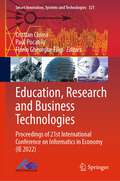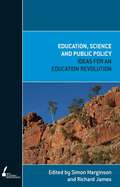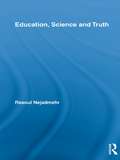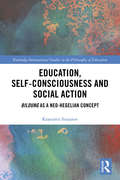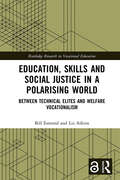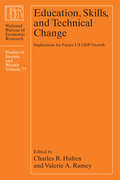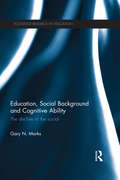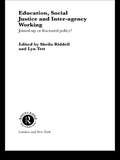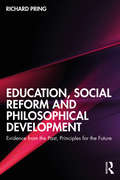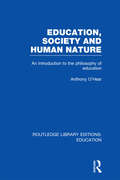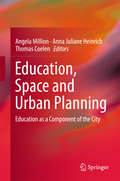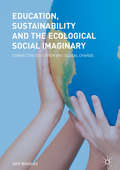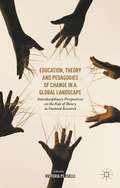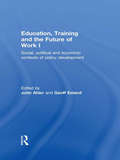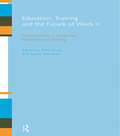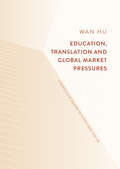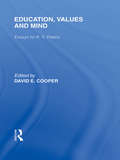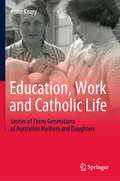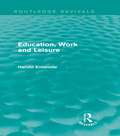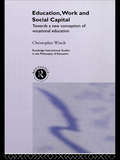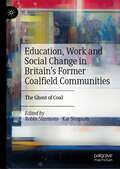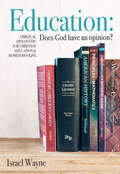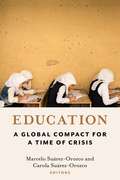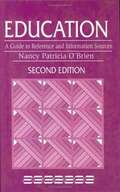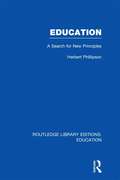- Table View
- List View
Education, Research and Business Technologies: Proceedings of 21st International Conference on Informatics in Economy (IE 2022) (Smart Innovation, Systems and Technologies #321)
by Florin Gheorghe Filip Cristian Ciurea Paul PocatiluThis book includes high-quality research papers presented at 21st International Conference on Informatics in Economy (IE 2022), which is held in Bucharest, Romania, during May 2022. This book covers research results in business informatics and related computer science topics, such as IoT, mobile-embedded and multimedia solutions, e-society, enterprise and business solutions, databases and big data, artificial intelligence, data mining and machine learning, quantitative economics.
Education, Science and Public Policy
by Simon Marginson Richard JamesWhen will the 'education revolution' really begin? Is the nation ready for the challenges of the global knowledge economy and the emerging centres of innovation around the world? What are the key problems and where are the policy solutions? These are the questions addressed in Education, Science and Public Policy, in which nine policy practitioners and educators shape the knowledge economy into bite-sized chunks for public policy debate. Contributors include Terry Moran, Maxine McKew, Collette Tayler, Barry McGaw, Shih Choon Fong, Simon Marginson, Michael Gallagher, Margaret Gardner and Ian Chubb.
Education, Science and Truth (Routledge International Studies in the Philosophy of Education)
by Rasoul NejadmehrWhat is the main problem of contemporary education? Rasoul Nejadmehr argues that the cardinal problem with education is that it does not have an adequate notion of truth underpinning it. Thinkers mainly tend to veer towards two poles - absolutism and relativism. While a one-sided tendency toward absolutism leads to reified categories of thought and alienation, a tendency toward relativism leads to lack of universality and nihilism. Education, Science and Truth suggests a way out by bridging not only divides between and within analytical and continental philosophy but also those of modernism and postmodernism. By using a range of issues, disciplines and literature, Nejadmehr formulates a new version of the concept of objectivity based on the inclusion of multiple perspectives, including ones from art, philosophy and marginalized groups.
Education, Self-consciousness and Social Action: Bildung as a Neo-Hegelian Concept (Routledge International Studies in the Philosophy of Education)
by Krassimir StojanovEducation, Self-consciousness and Social Action reconstructs the Hegelian concept of education, Bildung, and shows that this concept could serve as a powerful alternative to current psychologist notions of learning. Taking a Hegelian perspective, Stojanov claims that Bildung should be interpreted as growth of mindedness and that such a growth has two central and interrelated components, including the development of self-consciousness toward conceptual self-articulation and the formation of one’s capacity for intelligent social action. The interrelation between the two central components of education implies that learning is transformed into education only when it involves the self-consciousness and the identity of the learner. Since both are grounded in the ethical beliefs and values of the individual, transforming learning into education therefore requires that education also address students’ everyday ethical assumptions, as well as their articulation and conceptualization. This claim has a number of implications for educational policy and pedagogy; one being that learning and teaching in schools are educative only if they have ethical significance for both students and teachers. Another implication is that the point of departure for educative teaching becomes the actual, everyday ethical beliefs and experiences of the students, rather than fixed curricular contents. Students’ encountering with sciences and arts should aim at the conceptual articulation of those beliefs and experiences – an articulation which makes individual’s rational autonomy and self-determination possible. Education, Self-consciousness and Social Action will be of great interest to academics, researchers and postgraduate students interested in the philosophy of education. It should also be essential reading for anyone engaged in the study of Hegel’s work.
Education, Skills and Social Justice in a Polarising World: Between Technical Elites and Welfare Vocationalism (Routledge Research in Vocational Education)
by Liz Atkins Bill EsmondThis book explains how education policies offering improved transitions to work and higher-level study can widen the gaps between successful and disadvantaged groups of young people. Centred on an original study of ongoing further education and apprenticeship reforms in England, the book traces the emergence of distinctive patterns of transition that magnify existing societal inequalities. It illustrates the distinction between mainly male ‘technical elites’ on STEM-based courses and the preparation for low-level service roles described as ‘welfare vocationalism’, whilst digital and creative fields ill-suited to industry learning head for a ‘new economy precariat’. Yet the authors argue that social justice can nevertheless be advanced in the spaces between learning and work. The book provides essential insights for academics and postgraduate students researching technical, vocational and higher education. It will also appeal to professionals with interests in contemporary educational policy and emerging practice.
Education, Skills, and Technical Change: Implications for Future US GDP Growth (National Bureau of Economic Research Studies in Income and Wealth)
by Charles R. Hulten Valerie A. RameyOver the past few decades, US business and industry have been transformed by the advances and redundancies produced by the knowledge economy. The workplace has changed, and much of the work differs from that performed by previous generations. Can human capital accumulation in the United States keep pace with the evolving demands placed on it, and how can the workforce of tomorrow acquire the skills and competencies that are most in demand? Education, Skills, and Technical Change explores various facets of these questions and provides an overview of educational attainment in the United States and the channels through which labor force skills and education affect GDP growth. Contributors to this volume focus on a range of educational and training institutions and bring new data to bear on how we understand the role of college and vocational education and the size and nature of the skills gap. This work links a range of research areas—such as growth accounting, skill development, higher education, and immigration—and also examines how well students are being prepared for the current and future world of work.
Education, Social Background and Cognitive Ability: The decline of the social (Routledge Research in Education)
by Gary N. MarksAre socioeconomic inequalities in education declining? Is socioeconomic background becoming less important for people’s occupational class or status? How important is cognitive ability for education and later occupational outcomes? How do countries differ in the importance of socioeconomic background for education and work? Gary N. Marks argues that in western industrialized countries, pervasive views that socioeconomic background (or class background) has strong and unchanging relationships with education and later socioeconomic outcomes, resistant to policy and social change, are unfounded. Marks provides a large amount of evidence from many countries showing that the influence of socioeconomic background for education is moderate and most often declining, and socioeconomic background has only very weak impacts on adults’ occupation and earnings after taking into account education and cognitive ability. Furthermore, Marks shows that cognitive ability is a more powerful influence than socioeconomic background for educational outcomes, and that in addition to its indirect effects through education has a direct effect on occupation and earnings. Its effects cannot be dismissed as simply another aspect of socioeconomic background, nor do the usual criticisms of ‘cognitive ability’ apply. The declining effects for socioeconomic background and the importance of cognitive ability support several of the contentions of modernization theory. The book contributes to a variety of debates within sociology: quantitative and qualitative approaches, explanatory and non-explanatory theory, the relationship between theory and empirical research, the role of political ideology in research, sociology as a social science, and sociology’s contribution to knowledge about contemporary societies. It will appeal to professionals in the fields of education and sociology as well as postgraduate students and academics involved in the debate.
Education, Social Justice and Inter-Agency Working: Joined Up or Fractured Policy? (Routledge Research in Education)
by Sheila Riddell Lyn TettThis book explores policy and practice in a range of areas where education and other agencies (health, social and employment services and housing) interact. Its theme, of joined up policy and inter-agency working, is central to all those interested in promoting social justice for adults and children experiencing the effects of exclusion.
Education, Social Reform and Philosophical Development: Evidence from the Past, Principles for the Future
by Richard PringReflecting on the meaning and purpose of an education at the mercy of political changes and innovation, this book considers the social, historical, religious and cultural contexts that define education systems. With a particular focus on how historical contexts shape the nature of education and its relevance to wider society, it explores the history of education in relation to social reform, economic relevance and raising standards. The first part of the book describes the developing system of education within England and Wales from the 19th century, with reference to the growing consciousness of the need for ‘education for all’. The second part identifies key philosophical influences on the evolving understandings of education, and thereby of the developing policies and arrangements made in the light of those understandings which they generated. Finally, the third part of the book revisits the ‘aims of education’ in the light of the historical development and the philosophical critiques. This book will be of great interest to academics, researchers, postgraduate students and policy makers interested in the history of education and the moments that have defined it.
Education, Society and Human Nature: An Introduction to the Philosophy of Education (Routledge Library Editions: Education)
by Anthony O'HearIntended primarily for education students this book provides an introduction to the philosophy of education that tackles educational problems and at the same time relates them to the mainstream of philosophical analysis. Among the educational topics the book discusses are the aims of education, the two cultures debate, moral education, equality as an ideal and academic elitism. It examines the limitations of a purely technological education, and suggests the shape of a balanced curriculum. It critically analyses important educational theses in the work of Rousseau, Dewey, R S Peters, P H Hirst, F R Leavis, Ronald Dworkin and G H Bantock, among many others, and considers the philosophical copics of relativism, the nature of knowledge, the basis of moral choice, the value of democracy and the status of religious claims.
Education, Space and Urban Planning
by Angela Million Anna Juliane Heinrich Thomas CoelenThis book examines a range of practical developments that are happening in education as conducted in urban settings across different scales. It contains insights that draw upon the fields of urban planning/urbanism, geography, architecture, education and pedagogy. It brings together current thinking and practical experience from German and international perspectives. This discussion is organised in four segments: schools and the neighbourhood; education and the neighbourhood; education and the city and finally, education and the region. Contributors cover a wide range of contemporary and significant socio-political aspects of education over the last decade. They reinforce emergent thinking that space and its urban context are important dimensions of education. This book also underscores the need for more research in the relationships between education and urban development itself. Current urban planning does not fully connect our understanding in education with what we know in the spatial and planning sciences. Accordingly, this release is an early attempt to bring together a growing body of integrated and interdisciplinary reflection on education theory and practice.
Education, Sustainability and the Ecological Social Imaginary: Connective Education And Global Change
by Jeff BucklesThis book analyses the evidence for global change, and suggests that the Earth is going through a profound transformation, caused in large part by human action. Land, oceans, polar regions and the atmosphere are all being deeply affected by the human population's lifestyle: what should the educational response be to these various aspects of global change? To answer this, the values of an ecological response are developed, leading to the notion of an 'Ecological Social Imaginary', which looks at how humans can change their way of living to one that is more in harmony with the planet that they live on and depend upon. To enable this, an ecological form of education, Connective Education, is proposed. This focuses on how the human and natural world can be connected for the benefit of humankind and all living and non-living entities, joining head, hand, heart and spirit to the web of life. It is argued that through Connective Education, a particular type of person is formed: one who is able to take their place in the human and natural world, and in this way truly connect with their planet. The book will be essential reading for those working in the fields of Education and Environmental Studies.
Education, Theory and Pedagogies of Change in a Global Landscape: Interdisciplinary Perspectives On The Role Of Theory In Doctoral Research
by Victoria PerselliEducation, Theory and Pedagogies of Change in a Global Landscape
Education, Training and the Future of Work I: Social, Political and Economic Contexts of Policy Development
by John Ahier Geoff EslandA central claim of this volume is that public policy in education and training can only be properly understood if it is seen in relation to prevailing economic and employment conditions. It has become increaslingly apparent that the neo-liberal economic policies pursued by Western governments during the 1980s and 1990s have led to a growing world-wide 'work crisis'. Unemployment levels, particularly in Europe, remain persistently high, and for those in employment, job insecurity and long working hours have become the norm. The response of UK governments has been to promote 'flexibility' in employment practices while proclaiming the importance of improving skill levels through education and training.This volume challenges the adequacy of such an approach, and asks whether reliance on education and training reforms without additional political intervention in economic processes is capable of reversing current trends.Issues covered in this reader include:* the impact of globalization on employment trends* neo-liberal and neo-Keynesian approaches to employment policy* political reforms in education and training institutions* the impact of flexibilization on private life and the family.The two volumes in this series are readers for the Open University course Education, Training and the Future of Work, E837, a module of the MA in Education. The companion volume is Education, Training and the Future of Work II: Developments in Vocational Education and Training.John Ahier is Lecturer in Education at the Open University. Geoff Esland is Director of the Centre for Sociology and Social Research at the Open University and Course team Chair of E837.
Education, Training and the Future of Work II: Developments in Vocational Education and Training (Open University Reader 2 For The E837 Module Ser.)
by Sandy Sieminski Mike FludeThis volume focuses on the recent changes in education and training policy, mainly in the UK. The considerable developments of past years and the ways in which they have affected both education and training are examined. The contributors analyse the methods by which we educate our workforce, and look closely at the kind of training now offered to those in work.The chapters in this reader cover:* the role of the state* how economic factors influence education* national education and training policy* the political factor.Other countries including Germany are looked at, and there is reflection on the ways in which the 'new' industry led qualifications such as NVQs have fared. There is careful analysis as to how much the political climate of the time influenced developments.There is thorough research to back up claims made throughout the book, and many practical examples are referred to. What emerges is an incisive examination of current trends in education and the workplace.
Education, Translation and Global Market Pressures: Curriculum Design In China And The Uk
by Wan HuThis book investigates the market-driven transformation of the higher education sector and the response given by the translation programmes in the UK and China, two vastly different social and economic contexts. It provides an in-depth look at six selected case studies, critically analysing how social, economic, and political factors have affect curriculum designs in different translation programmes. This innovative volume contributes to the development of knowledge in an important area of translation studies and opens a new way for providing both cross-national and cross-disciplinary perspectives in analysing the curricula of translation programmes.
Education, Values and Mind (International Library of the Philosophy of Education Volume 6): Essays for R. S. Peters
by David CooperR. S. Peters has not only been the major philosopher of education in Britain during second half of the twentieth century, but by common consent, he has transformed the subject and brought it into the mainstream of contemporary philosophy. The ten essays in this book attest to his influence whether by critical examination of his ideas or by original treatment of topics in which has has inspired a new interest.
Education, Work and Catholic Life: Stories of Three Generations of Australian Mothers and Daughters
by Anne KearyThis book reports on innovative interdisciplinary research in the field of cultural studies. The study spans the early twentieth to twenty-first centuries and fills a gap in our understanding of how girls’ and women’s religious identity is shaped by maternal and institutional relations. The unique research focuses on the stories of thirteen groups of Australian mothers and daughters, including the maternal genealogy of the editor of the book. Extended conversations conducted twenty years apart provide a situated approach to locating the everyday practices of women, while the oral storytelling presents a rich portrayal of how these girls and women view themselves and their relationship as mothers and daughters. The book introduces the key themes of education, work and life transitions as they intersect with generational change and continuity, gender and religion, and the non-linear transitional stories are told across the life-course examining how Catholic pasts shaped, and continue to shape, the participants’ lives. Adopting a multi-methodological approach to research drawing on photographs, memorabilia passed among mothers and daughters, journal entries and letters, it describes how women’s lives are lived in different spaces and negotiated through diverse material and symbolic dimensions.
Education, Work and Leisure (Routledge Revivals)
by Harold EntwistleFirst published in 1970, this book considers the alleged distinction between ‘education for life’ and ‘education for work’ and exposes the fallacies on which this and other similar distinctions are based. It shows that ideas on this subject are inextricably intertwined with wider views on the nature of culture, the limits of individual educability and the provision of educational opportunities. Indeed, Dr Entwistle argues that students need to be well informed of these issues in order to be in a strong enough position to face problems of education and social development that will occur during their working lives.
Education, Work and Social Capital: Towards a New Conception of Vocational Training (Routledge International Studies In The Philosophy Of Education #Vol. 11)
by Christopher WinchThis book provides an integrated treatment of the relationship between political economy and vocational education at the beginning of the twenty-first century. Approaching the subject from a philosophical perspective the author engages with debates about* the work-related aims of education * the moral and spiritual significance of work * the concep
Education, Work and Social Change in Britain’s Former Coalfield Communities: The Ghost of Coal
by Robin Simmons Kat SimpsonThis edited book presents a range of chapters written by new and established authors, drawing on a range of different perspectives and traditions to critically analyse education, work and social change in the former coalfields. Historically, coal was one of Britain’s major industries, employing over a million men at its peak. But mining was more than an occupation - it was a way of life for those living and working in coalfield communities. Work, leisure, family relations and other dimensions of social life were centred upon the coal industry and its related institutions such as trade unions, working-men’s clubs and welfare institutes. These communities have, however, undergone significant social and economic change over time, not least in terms of the pain and suffering associated with the Great Strike of 1984–85, the successive waves of pit closures which took place thereafter and the eventual demise of the coal industry. The book will be of interest to academics drawing on sociology, social policy, history, geography and other subject disciplines.
Education: A Biblical Apologetic for Christian Education & Homeschooling
by Israel WayneStudents in America will spend over 14,000 seat hours in a classroom before they graduate from high school. On the other hand, most Christian children spend less than an hour a day in meaningful interaction with their parents, and only a few hours a week (at most) in church. Is it reasonable for us to assume that the Christian instruction they receive during off-hours will outweigh the thousands of hours of anti-Christian perspectives they are bombarded with by the media and the public school system? What does God say about how He expects Christians to educate their children? This book will radically challenge your paradigms and biases, but will consistently point you to the Word of God as the final answer for all of life, including education. Great resource for pastors, parents, and grandparents to understand the role of education in a Christian family. Aligns with the core philosophy of Master Books Curriculum and can be used as an apologetic for Christian education.
Education: A Global Compact for a Time of Crisis
by Suárez-Orozco, Marcelo; Suárez-Orozco, CarolaIn an age of catastrophes—unchecked climate change, extreme poverty, forced migrations, war, and terror, all compounded by the COVID-19 pandemic—how can schooling be reengineered and education reimagined? This book calls for a new global approach to education that responds to these overlapping crises in order to enrich and enhance the lives of children everywhere.Marcelo Suárez-Orozco and Carola Suárez-Orozco convene scholars and practitioners from a range of disciplines—including anthropology, neuroscience, demography, psychology, child development, sociology, and economics—who offer incisive essays on the global state of education. Contributors consider how educational policy and practice can foster social inclusion and improve outcomes for all children. They emphasize the centrality of education to social and environmental justice, as well as the philosophical foundations of education and its centrality to human flourishing, personal dignity, and sustainable development. Chapters examine topics such as the neuroscience of education; the uses of technology to engage children who are not reached by traditional schooling; education for climate change; the education of immigrants, refugees, and the forcibly displaced; and how to address and mitigate the effects of inequality and xenophobia in the classroom. Global and interdisciplinary, Education speaks directly to urgent contemporary challenges.Contributors include Stefania Giannini, the director of education for UNESCO; development economist Jeffrey Sachs; cognitive psychologist Howard Gardner; Carla Rinaldi, president of the Reggio Children Foundation; and academics from leading global universities. The book features a foreword by Pope Francis.
Education: A Guide to Reference and Information Sources (2nd edition)
by Nancy Patricia O'BrienFocusing on English-language publications of the last decade, this guide identifies and describes key reference and information sources in the field of education today.
Education: A Search For New Principles (Routledge Library Editions: Education)
by Herbert PhillipsonContributing to early debates on nature versus nurture, schools and the social environment, town planning and a free comprehensive education, the author discusses key educational issues against the background of a distintegrating Europe in the midst of war.
